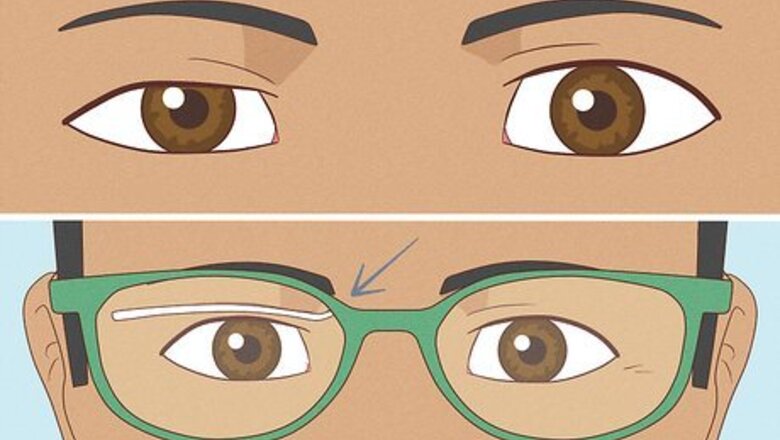
views
Ptosis crutch
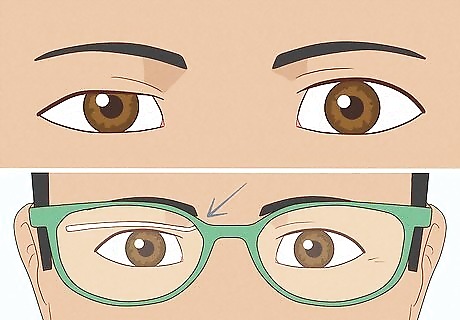
Attach this device to your glasses to help elevate a drooping eyelid. A ptosis crutch can be a great option if you can’t or don’t want to have any surgical procedures done. In many cases, the crutch can be fitted to your existing eyewear and hold open your eyelid up so that your eyes are more symmetrical. Talk to your eye doctor about ptosis crutch options and whether they can be installed on your specific type of glasses. Wearing a ptosis crutch in your glasses is going to be slightly visible since it's a plastic or metal bar holding up your eyelid, but it's discreetly connected to your glasses. An eyewear professional might charge around $100 USD to add a ptosis crutch to an existing pair of glasses.
Medication

Ask your eye doctor about a new prescription med for ptosis. As of early 2021, the prescription eye drop Upneeq is the only medication approved in the U.S. to treat a droopy eyelid caused by aging (acquired ptosis). You’ll need to apply the eye drops once daily to see ongoing results. Consult with your eye doctor to see if Upneeq may be an alternative to surgery in your case. Upneeq causes the muscle in the drooping eyelid to retract further. It works almost immediately, but must be reapplied daily to maintain the effect. Upneeq is not effective for ptosis caused by injury or other medical conditions. Upneeq costs around $90-$120 USD for a 30-day supply.
Botox injections
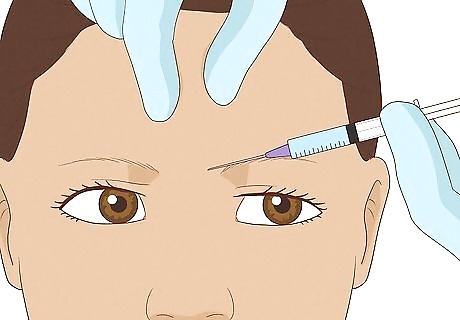
Botox may lift a drooping eyelid by tightening the surrounding skin. This is a relatively quick and low-pain option that can quickly tighten the skin around your eye and get rid of any droopiness. Because Botox injections weaken muscle tissue, however, they can increase eyelid droopiness if administered incorrectly, so always have a trained and experienced medical professional do the procedure. Your treatment might require a single injection in the brow area above your drooping eyelid, or one or more additional injections in this area as well as the area between your eyebrows. The effects of Botox injections typically last around 3-4 months. Botox injections often cost around $350-$500 USD for each area that is injected.
Eyelid lift
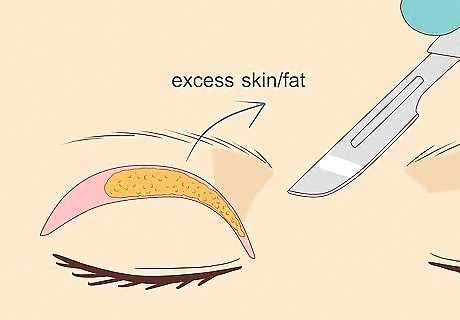
This procedure removes excess tissue from your drooping eyelid. During an eyelid lift (blepharoplasty), the surgeon removes extra skin, muscle, and/or fat from your eyelid. Doing so lifts and tightens your eyelid, making your eye appear larger and more symmetrical. Talk to an ophthalmologist, oculoplastic surgeon, or your general eye doctor for more information about blepharoplasty and whether it’s right for you, as well as any risks involved. This is typically an outpatient procedure done under local anesthesia. Some of the risks involved in blepharoplasty are infection and bleeding, skin discoloration, difficulty opening your eyes, and noticeable scarring. The average cost of an eyelid lift is in the range of $3,000 USD.
Eyebrow lift
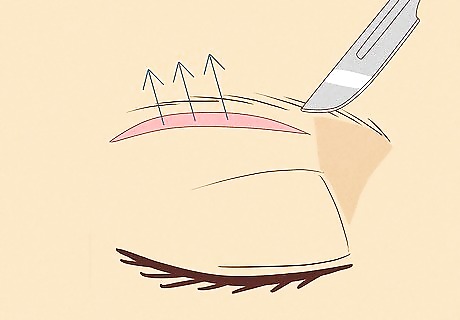
Consider undergoing this procedure along with blepharoplasty. Especially if you have ptosis due to aging, you likely have both a drooping eyelid and a drooping eyebrow. If so, look into having both an eyelid lift (blepharoplasty) and an eyebrow lift, both of which are inpatient surgical procedures that involve the removal of excess tissue. Alternatively, you can undergo either procedure individually as needed. You’ll have some light scarring above your eyelid, but this can be concealed with makeup and usually disappears within a year. Always have a qualified, licensed, experienced oculoplastic surgeon perform eyelid or eyebrow lift procedures. The average eyebrow lift typically costs somewhere around $3,500 USD.
Ptosis surgery
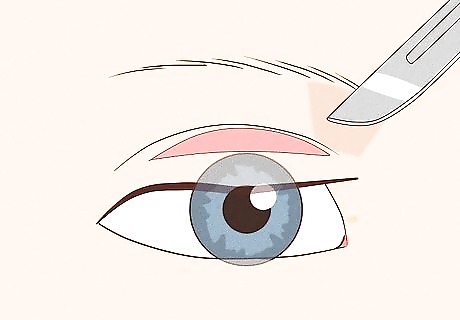
This tightens the muscle and tendon tissue in the drooping eyelid. Ptosis surgery is typically an inpatient procedure done with local anesthesia, which allows the surgeon to fine-tune the symmetry between your eyelids. You won’t feel much if any pain during the procedure, but your eyelids may feel sore for a few days afterwards. Talk to your doctor to see if this surgery is an option for you. Ptosis surgery is a fairly low-risk procedure, but can in some cases result in scarring, infection, bleeding, or persistent dry eyes. Ptosis surgery often costs between $2,000 and $5,000 USD, depending on your particular circumstances.
Orbital surgery
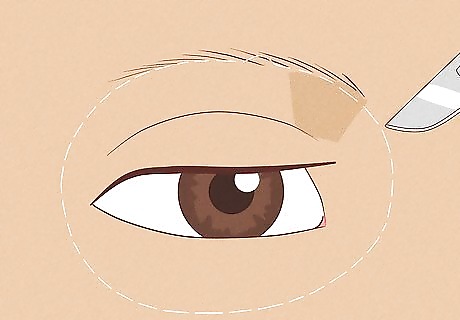
This procedure repairs structural issues with orbital bones and tissues. Most cases of eye asymmetry don’t involve the actual orbital bone structures, but congenital conditions or traumatic injuries can cause asymmetry. If so, orbital surgery can reconstruct the orbital bone and surrounding tissues to improve both functionality and appearance. Consult with an eye surgeon to see if orbital surgery is right for you. Orbital surgery is a reconstructive procedure that is more complex and involved than an eyelid lift, eyebrow lift, or ptosis surgery. Talk to your eye surgeon about the details of the procedure and expected recovery time. Orbital surgery will cause temporary bruising, swelling, and possibly scarring, and may cause short-term blurred vision, double vision, or related issues. Long-term vision problems that require additional treatment are unlikely but possible. Full recovery from orbital surgery might take 3 weeks. Orbital surgery isn’t cheap! Expect it to cost somewhere in the range of $7,500 to $15,000 USD.
Cosmetics
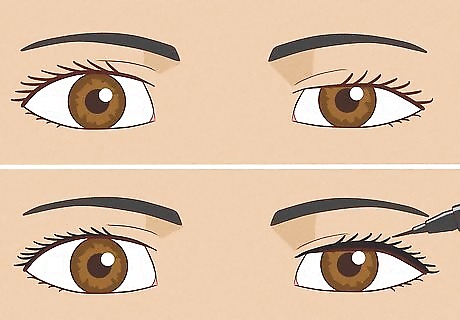
Conceal asymmetry with eyeshadow, eyeliner, and/or mascara. You can’t fix asymmetrical eyes with makeup, of course, but you can help minimize the appearance of asymmetry—typically by applying a bit more product to the smaller eye. Try one or more of the following: Eyeshadow. Apply powder eyeshadow a little bit higher up on the eyelid of the smaller eye. Try a lighter color like champagne gold or pink to make your eyes appear brighter and fuller. Eyeliner. Make a thicker line on the droopier eye, and a thinner line on the opposite eye—this line should be further down, filling in the gaps where your eyelashes are. Mascara. To make your drooping eyelid appear higher up, apply lengthening mascara to the top lashes on that side. Don’t add any to the other eye. To make your eyelashes curl up, use a heated mascara wand or simply heat up your mascara using a hairdryer before applying it.
Eyelid tape
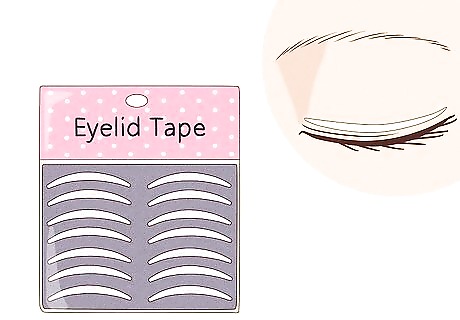
Try this for an occasional, short-term eyelid lift. Eyelid tape refers to small, curved adhesive strips that are applied to sagging eyelids with small applicator sticks. They’re barely visible once applied, especially if you put on makeup afterward, and many brands and types can be found at beauty retailers, big-box stores, and online. Eye doctors tend not to be big fans of eyelid tape—they have concerns about things like glue allergies, further stretching of the eyelid skin, and possible impacts on eye function. Consider talking to your doctor before using eyelid tape and, if you choose to proceed, using it only sparingly. You can get a multi-pack of eyelid tape for around $10-$20 USD.
Sleep
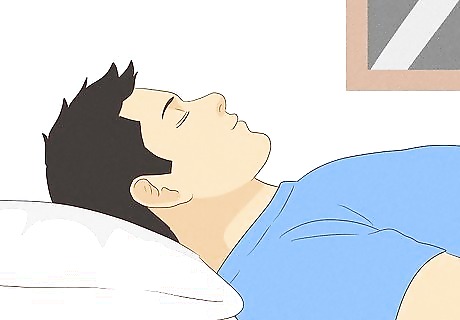
Sleep won’t fix ptosis, but a lack of sleep may make it worse. Your eyelids feel heavier when you’re tired, and they look that way too! If you already have a drooping eyelid, a lack of high-quality sleep may exacerbate the problem and make your eyes appear even more asymmetrical. Alternatively, getting a good night’s sleep may help tighten and smooth the tissue around your eyes. Everyone’s sleep needs are different, but it’s generally best to aim for 7-9 hours of uninterrupted, high-quality sleep.
Natural remedies
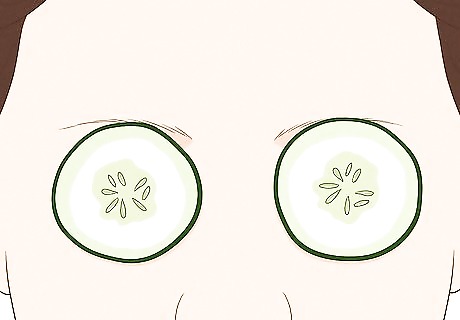
They’re usually safe to try, but are unlikely to make any difference. You can find a wide range of natural remedies for drooping eyelids online—cucumber slices, chamomile tea bags, aloe or egg white face masks, icing, even eating more grapes! Some of these methods may help reduce puffiness and tighten the skin around your eyes, but there’s no reason to think they’ll do anything to address your actual eye asymmetry. While natural remedies are unlikely to cause harm, applying products—even natural ones—to your eye area may in some cases cause irritation, discomfort, or other undesirable effects. If this happens to you, stop the treatment and contact your eye doctor.
Facial exercises
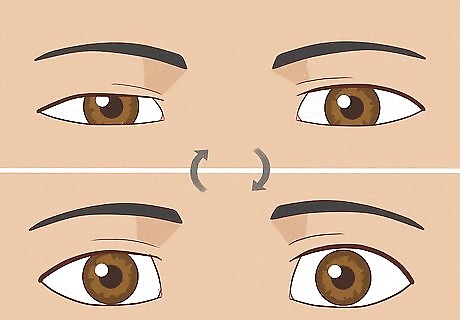
Like natural remedies, “face yoga” is safe but unlikely to help. Be wary of outlandish claims for the benefits of facial exercises—often called “face yoga”—in fixing droopy eyelids. Generally speaking, it’s not possible to strengthen or tighten eye muscles and tissues through exercise. But “face yoga” won’t hurt you, so consider giving the following exercises a try: Create a circle around your eye with your thumb and index finger, then repeatedly switch between squinting and forehead wrinkling. Open your eyes as wide as possible for several short bursts. Create pressure on your forehead with your fingers, then create resistance by pushing your forehead up using your facial muscles. Squint repeatedly while using your first two fingers to press down on the inside and outside corners of your eye. Repeatedly open your eyes wide while sticking out your tongue, then go back to a resting state.

















Comments
0 comment